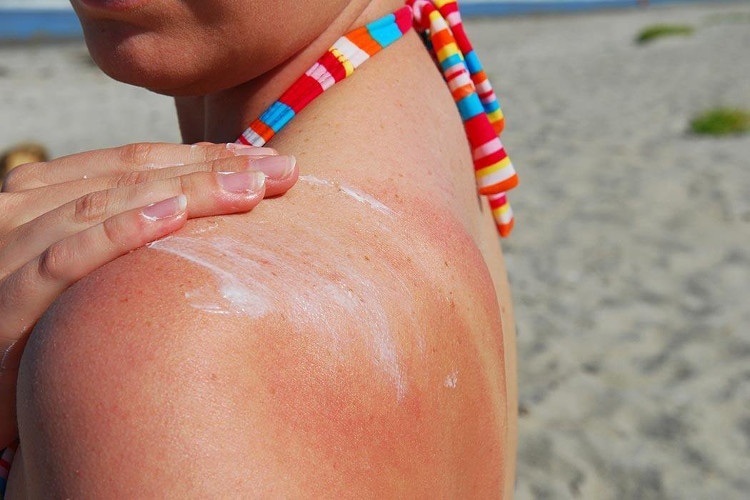People who have to say 'no' to sunscreen
Sunscreen is the most "unseen thing" of women because it not only helps skin avoid darkening but also prevents cancer. However, not everyone can use this cream.
Sunscreen as a shield, helps protect skin from sun damage - the cause of melasma, tanning and especially dangerous skin cancer risk.
According to research in the Annals of Internal Medicine, people who use sunscreen daily have skin that looks much younger. SPF 15 or higher sunscreen prevents 93% of UVB ultraviolet rays and also filters out UVA rays. In addition to being the culprit for skin cancer, UVB and UVA rays also cause skin aging.
Scientists at the Queensland University of Technology have studied the impact of sunscreen on skin cancer prevention.

Limit sunscreen to sensitive skin.(Photo: Welcommon).
Scientists have tested that sunscreen is able to protect a gene called P53 . Genes against three types of skin cancer are basal cell carcinoma, keratocellular cancer and melanoma cell cancer.
Elke Hacker, the lead researcher, said that when a region of the skin is affected by sunlight, the P53 gene will immediately move there and heal the damaged skin, while not allowing the cell. Cancer formed.
Therefore, without the protection of sunscreen when the skin is constantly exposed to sunlight, the P53 genes will be altered to facilitate cancer cells to form and develop.
Absolute objects should not use sunscreen
Since it is a topical product on the skin, sunscreen has a great impact on your skin.
- Sensitive skin : People with sensitive sites are prone to skin irritation or even allergy if using sunscreen can lead to dermatitis and infection.
- Acne skin : For people who are having skin problems such as an itchy rash or acne.If you want to use sunscreen, patients need to seek advice from specialized doctors to avoid damaging the skin.
- Pregnant women : In these products there are often ingredients that are easy to cause side effects like coticoids.This substance is included in cosmetics that have a white, glowing effect, but if high concentrations are absorbed through the skin, it causes atrophy, elasticity, skin pigmentation disorders and many other risks.
- Interesting mysteries about sunscreen
- FDA claims: Sunscreen tablets are not as good as you think
- The truth needs to know about sunscreen
- Experts warn of risk from 'homemade' sunscreen
- Most of us are making serious mistakes when using sunscreen
- Video: Automatic sunscreen for seafarers
- Nearly three-quarters of sunscreens do not work as advertised
- Why can sunscreen protect against sunshine?
- Use sunscreen when your baby can prevent cancer later
- Sunscreen can prevent melanoma
- The first sunscreen in the world
- Why should you apply sunscreen even when flying?
 Green tea cleans teeth better than mouthwash?
Green tea cleans teeth better than mouthwash? Death kiss: This is why you should not let anyone kiss your baby's lips
Death kiss: This is why you should not let anyone kiss your baby's lips What is salmonellosis?
What is salmonellosis? Caution should be exercised when using aloe vera through eating and drinking
Caution should be exercised when using aloe vera through eating and drinking